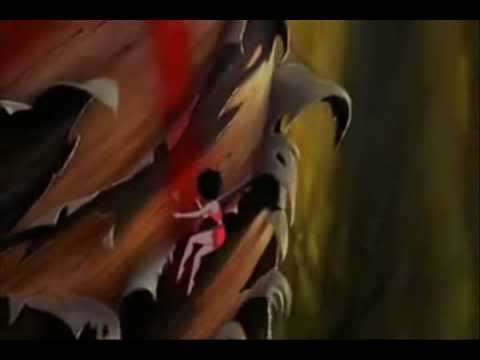
I'm a sucker for all things natural. I love the outdoors; I dislike cars, cities and other polluters; I cried during both Fern Gully and Avatar when the trees were being destroyed (does anyone else see uncanny similarities between these movies?; And yes, I did choose a Fern Gully image over Avatar): as a whole, I willingly admit to having a very romantic idea of nature as pure, beautiful, and transcendent. In my mind, all our problems stem from industrialization and technology, no matter how naive and unreasonable this opinion may be (and how ironic that I've created a blog focused around the technological sublime). It's only natural, then, that William Wordsworth has always been one of my favorite poets. There's a time for abstract, deep, depressing poetry to make you think and feel horrible, but when I want something calming and fulfilling, I turn to Wordsworth and revel in his sublime depictions of the natural world. Now, since the purpose of this blog is to show how the sublime can be found in our modern, technology-driven world, and the ways in which this technological sublime is both similar to and differs from traditional perceptions of the sublime, I've decided to revisit one of Wordsworth's great poems, "Tintern Abbey*," and apply to it the technological sublime that I've been researching.
In the poem "Tintern Abbey," Wordsworth describes his second visit to the River Wye in Wales, describing the wonder he feels at the beauty of the area and relating his present experience to the memory of five years previous, when he had visited the same place "in the hour of thoughtless youth" (lines 86-87). Although Wordsworth describes a sublimity arising from nature, and surviving only in spite of humanity's impact, many aspects of the sublime that he describes can also be experienced through modern technology, especially the internet.

Wordsworth establishes the sense of the sublime within the first few lines of the poem, when he describes the "steep and lofty cliffs,/ That on a wild secluded scene impress/ Thoughts of more deep seclusion" (lines 5-8). This depiction shows where, in many cases, the sublime arises: from those things much greater than ourselves, in this case "steep and lofty cliffs." Because of their scale and separateness from civilization or the control of man, these cause in Wordsworth "thoughts of more deep seclusion," emphasizing for him how far he is from the familiar. Though he already is in a secluded area, this level of seclusion is something more, a mental as well as a physical separateness from humanity, which allows the sense of the sublime - the recognition of those things greater than the mind can comprehend - to take hold. This relates in an interesting and unexpected way to the technological sublime of the internet. The immediate assumption would be that such a feeling of seclusion would be unreachable in something as intimately connected to ourselves as technology, which is created by and for mankind. And yet we can see how the internet draws us away from the physical world and the familiar into a new and very complicated universe. Though created by us, the number of contributors and complexity of the information has morphed the internet into something far greater than ourselves, so great and all-encompassing that it really is incomprehensible. And this can bring a paradoxical sense of seclusion, of separateness from the familiar and manageable, despite the supreme connectedness that the internet represents. The internet becomes an object as much larger than ourselves as Wordsworth's "lofty cliffs," and just as outside of our control.
Despite the sublimity of the internet that we can see if we truly meditate on it, on a typical day as we're surfing the web or stalking our friends on Facebook we're not likely to be overcome by a sense of awe at the grandness of this worldwide network. Instead, we usually flit between windows and tabs, pleased and impressed with the convenience, entertainment, and utility of the technology, but giving no thought to its full extent and potential. This is similar to how Wordsworth describes his first visit to the River Wye, "when like a roe/ [he] bounded o'er the mountains . . . The mountain, and the deep and gloomy wood,/ Their colours and their forms, were then to [him]/ An appetite" (lines 77-80). At this time he experienced and enjoyed nature, loving it for all its elements, hungry to experience more; and yet he did not yet have the perspective that would give him a true understanding of nature's sublimity. Just as it takes true introspection and consideration of the internet or other modern technology to understand its true potential greatness or terror, Wordsworth needed time and experience to truly put nature into perspective and see it's sublimity. He describes how he looks at nature differently now, after his experiences in the world and now that he has gained an understanding of humanity. He now sees not only the beauty of nature, but its full connectivity and scope, and the power it has to connect all things:
"For I have learned
To look on nature, not as in the hour
of thoughtless youth, but hearing oftentimes
The still, sad music of humanity,
Nor harsh nor grating, though of ample power
To chasten and subdue. And I have felt
A presence that disturbs me with the joy
of elevated thoughts, a sense sublime
of something far more deeply interfused,
Whose dwelling is the light of setting suns,
And the round ocean and the living air,
And the blue sky, and in the mind of man,
A motion and a spirit, that impels
All thinking things, all objects of all thought,
And rolls through all things." (lines 85-102)
Though the internet may not literally contain "the light of setting suns," it contains images and media that can be equally impressive. It is a thing "deeply interfused" and can be considered to "roll through all things," in the way that it connects the world, all places and all people into one network unlimited by space. In it we can find this same kind of power to influence our thoughts and actions that Wordsworth experiences in nature, if only we make the effort to see it. The internet is incredibly grand and powerful, uncontrollable, and both intimately connected with and utterly separate from ourselves. It is a perfect example of the sublime.
* The full name of the poem is "Lines Composed a Few Miles above Tintern Abbey, on Revisiting the Banks of the Wye during a Tour. July 13, 1798."

Dr. Burton shared this post with us in our Digital Civilizations class today and I wrote a response on my blog. Check it out. http://bricolorful.wordpress.com/2010/10/07/beyond-comprehension/
ReplyDeleteWhat are your feelings towards Google Earth, Google Street View etc.? Though I am fascinated by these and other programs, they almost create within me a deep sense of disappointment—as if my sense of exploration, discovery, mystery, and the unknown (all of these encompassed by the sublime) have been deflated and stamped out of me. Being able to view the entire earth from my computer screen, to me, is almost the epitome of anti-sublime. Technology has made the world smaller (and in many ways this is a good thing), that is for certain, but in doing so has it in some sense destroyed that from which “the sublime arises: from those things much greater than ourselves”?
ReplyDeleteGood question Jeffrey. I think in some ways it's true that Google Earth and that sort of thing can take away some of the potential for exploration in our world - for example, before I came to South Africa I had already walked up and down the streets on Google Street View, so when I arrived what I saw was already familiar. But at the same time, an image really can't replace an experience. I may have been able to see the streets and buildings, but without the feeling, sounds and smells that really make it unique and foreign. It's the difference between seeing a picture of the Grand Canyon and standing on the edge of it.
ReplyDeleteThanks for your post. I read it for my Digital Civilization class. I like how you ended your post with "Though the internet may not literally contain "the light of setting suns," it contains images and media that can be equally impressive. It is a thing "deeply interfused" and can be considered to "roll through all things," in the way that it connects the world, all places and all people into one network unlimited by space. In it we can find this same kind of power to influence our thoughts and actions that Wordsworth experiences in nature, if only we make the effort to see it."
ReplyDeleteHow would you suggest we appreciate the Internet more and how do we express this appreciation.
I think I will write a post on my blog: americanbeautybykristinacummins.blogspot.com about one of wordsworth's poems and see what insights I can gain.
Thanks again.